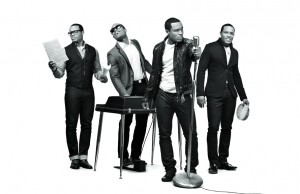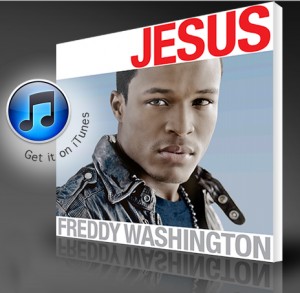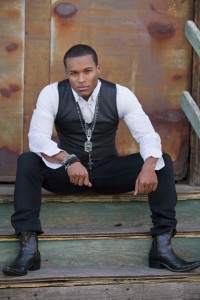Freddie Washington Jr.: A Musician Sharing His Faith Through His Music and Spreading Hope to Independent Musicians Everywhere
By Kaylene Peoples | May 2nd, 2011 | Category: Indie Hotspot, Music | Comments Off on Freddie Washington Jr.: A Musician Sharing His Faith Through His Music and Spreading Hope to Independent Musicians Everywhere“I am a Christian, and the day I gave my heart to Jesus was the most memorable moment of my career. Music is the most important thing that I’m doing now. The more my relationship deepens with Jesus the more my music changes. Things come out of me musically that I didn’t even know existed.” –Freddy Washington Jr., Recording Artist
Freddy Washington Jr. is a multi-faceted musician. He just released his first album last month, and it is a beautiful mix of pop, jazz, a little country, and gospel all rolled up in one. His single is called “Jesus.” I have interviewed several musicians, and Agenda Magazine music reviewers (Sean Mckenzie, Justin Le Mort, and I) have listened to and reviewed a countless number of independent artists, but never a faith-based artist; Freddy Washington Jr. is the first who comes from a vast musical background. His father, Bishop Freddy Washington Sr., and his mother, Dr. Pamela Washington, lead the W.O.R.D. Church in Penns Grove, New Jersey, where Freddy leads worship passionately; and his father’s music is what inspired him to become a musician. Freddy Washington Jr. is a talented producer and writer, both of which he has received much success. He has earned Grammy and Stellar and Dove Award nominations for production with the artist Da’Truth and Gospel newcomer Melinda Watts, and he has taken that experience, combined it with his own talent, and produced his first album.
I had a chance to interview this talented, passionate recording artist. Washington shared his opinions, his faith, and offered hope to independent musicians everywhere.
Interview by Kaylene Peoples
Responses by Freddy Washington Jr
How would you describe your music?
I studied a lot of different styles. I studied gospel, country, pop. I feel like I‘ve gone through musical phases in my life where I would just park down on a genre and just immerse myself and learn it. So I think that my style has come out of all the things I love about those genres.
So it’s sort of an eclectic mix of all your musical influences.
I’ve pulled from everything. Out of that comes my style. I use that stuff to express myself the purest way I know how. I don’t make decisions based upon what is technically right. I just go with what moves me.
That’s an interesting point: you don’t make decisions based upon what’s technically right. Wouldn’t you agree that when musicians really know their craft, they can start breaking the rules anyway.
Yeah, well, you know when a rule doesn’t make sense. And obviously, the rules are important; but when you really know, it’s kind of telling you, rather than you superimposing the rules. I just know that this sounds right. And though technically it goes against the grain of what we’ve done on the past, I know in my heart that it’s right. I can feel that it’s right. And if I feel that it’s right, I can’t be the only one.
 I think it is all about that instinct. I feel like certain artists cheat. They think, “Well, this is my audience. I have to keep them happy.” But what are they really feeling? Instead, a lot of times they’re just doing robotic motions, churning out cookie-cutter song after cookie-cutter song.
I think it is all about that instinct. I feel like certain artists cheat. They think, “Well, this is my audience. I have to keep them happy.” But what are they really feeling? Instead, a lot of times they’re just doing robotic motions, churning out cookie-cutter song after cookie-cutter song.
You’ll find that when you break those rules, your audience will love you for it.
What makes you unique as an artist?
I’m not afraid to express myself musically apart from what technically might be right. I’m honest about my taste and the things I’m interested in, and the things that move me are the things I should use. People are all unique. We all have fingerprints. They look similar, but none of them are quite the same. Though my musical taste might be similar to others, there’s that one little tweak, that one little thing different that makes me me. And if I communicate that and ignore the status quo of the industry telling me I have to do it a certain way, then I think that there are other people who can appreciate that.
Give me one or two examples of what moves you.
Well, now you’re getting into influences. I grew up on 80s pop, Phil Collins, Sting, The Police. From the womb it moved me; I’m an 80s baby. I started to find some of those same harmonic formulas in country or rock. A lot of those move me instinctively because they were the beginning of my musical experience just as a listener. But when I started to listen to more gospel music, I started to immerse myself into that. There are just certain structures and chord changes that are similar to even the rock and pop stuff. There was a common thread even though it was very different in ways. I’m moved by a lot of different things, but I love very meaningful melodies and harmonic combinations. One thing that really moves me about country music is songwriting. There are no wasted chords. There is no wasted ornamental stuff. It all means something, and it’s all there for a reason. I think I just get overwhelmed when I hear that somebody knew exactly what the song needed. I found that in every genre, but there are some genres where the song takes precedence; and those are the ones that have moved me throughout the history of my musical experience.
Ah, so you’re a purist.
Exactly.
I understand you are branching out, going more mainstream. Now what does that mean?
The record I am doing now deserves to be heard because of the message. I felt like the best way to get that message heard is to try to communicate that to a larger audience. It doesn’t necessarily mean that you have to sacrifice anything. It just means that you have to be brave enough to say, “You should listen to this.”
You’re going to hate this question, but pigeon hole it. Give me a style that this is.
Yeah, I don’t like this question. I can’t. There are influences. There’s gospel in it, rock, there’s classical movement in it. It will remind you of some composers. It’s purposeful. There’s country music.
 The music industry has changed drastically in the last 10-15 years. How has it affected you if at all, and have you been utilizing any of the new 2.0 media tools for social networking, such as Facebook and Twitter?
The music industry has changed drastically in the last 10-15 years. How has it affected you if at all, and have you been utilizing any of the new 2.0 media tools for social networking, such as Facebook and Twitter?
The change on the industry has made a way for me and a lot of other people. With being online, it being a digital download age, it puts us indie people on the same level as the majors. You can click on me just as easily as Justin Timberlake. People that generally wouldn’t have a voice can now be heard. It’s amazing what we’re getting out of that. I think that it’s remarkable the kind of people that would have probably been passed up because they didn’t have the muscle or the influence to be heard by the masses. There was a time when radio stations were into breaking new people.
Those were the Motown days!
Back in the day, but then it got to a point where it was all about breaking the newest thing that some people were doing. And that’s fine, but you lose a lot, and you miss out on a lot of great people. I think it’s come back to being able to be heard. Out of that comes great music because you hear things that you never would have heard, and you’re influenced by it. And you do things that you never would have done if you had only heard the same five top people. So I think it’s changed the landscape tremendously. I am on Facebook and Twitter. But I’m not very cool; my dad was on Facebook before I was, so that was kind of funny. But I’m into it now, and I think it’s a good way for artists to be in touch with their fans, and to stay connected.
I think that’s what we want. We want to be able to ask a question when we want to ask that question. Before, the artist was so far away and untouchable.
Absolutely, I want to know what the people who listen to me think. Your first record you do pretty much whatever you want. But once people start supporting you, you have to care. If it weren’t for the fans, there wouldn’t be a way for you.
What advice would you give to a musician coming up, trying to make a name for him-/herself today?
Whatever’s for you, you’ll get it. But you just have to keep working hard and be you. This is a cliché but it’s true. You have to be yourself. We’ve already had a Stevie Wonder, a Nat King Cole, Mick Jagger. We’ve had all that. We need to hear what’s inside each and every one of us, uniquely. And we’re all influenced, but we can’t be carbon copies.
Highest Moments
I’m having them right now. It’s been a long road of work and practicing, failing and succeeding. I think I’m on the upward climb. It’s time.
What’s your practice time?
I went to school at the University of the Arts in Philly. I used to practice all the time. Now, because of what’s going on, I’m only getting in maybe two or three hours a day.
Any Lows? Hurdles?
I don’t consider the hurdles of practicing a low. You have to go through that fight as a musician. You have to sit in the practice room, be upset for most of the day, then have a breakthrough the rest of the day; then go relax. One low point I will say, though, I came in contact with some industry people that I respected (still respect), and they said some discouraging things about my music and about what people are ready for and what they want to hear. So I think that was a low point. It’s hard enough as an artist to believe in yourself. It’s hard enough to fight second-guessing yourself all the time. But when you have people you respect and ultimately when someone that you’re depending on to help you get to that next level, telling you that you’re way off base, or that people aren’t ready for your music, it can be discouraging. But that low just sets you up for a bigger high. If you can fight through that, then you know that what you have is worth hearing. Anything worth having is worth fighting for.
You know you’re right about that. You have to believe in yourself 100,000 percent. You’re going to hear it all. The more famous you get, they’re going to find anything they can to pick you apart. And you have to be so solid in what you’re doing anyway. It is discouraging, too, when you’re hearing industry professionals that have been around and have broken artists, and they’re telling you, “Oh, you need to change this”; or “You’re not what people want to hear.” How do they know what’s in people’s heads? Sometimes I don’t think people know what they want to hear until they hear it.
Yes, definitely; and it’s so subjective. It’s too subjective to say what will and what will not work. I think that some labels and some executives have become the gatekeepers and they kept a lot of great music from being heard. I think that times changing and the mediums changing have made a way for that stuff to get heard. To artists I’d say, “If you survive the frustration of being misunderstood, you’ll make it.”
Any plugs? Here’s your chance to talk about anything you want.
The first thing I want to plug is a scripture, John 3:16: For God so loved the world that he gave his only begotten son and whosoever believes in him shall not perish but have everlasting life. The second thing I want to plug is my record. The Jesus Record. It’s just a record about hope and redemption and real love.
You can purchase Freddy Washington’s single, “Jesus” on iTunes. Visit www.freddywashington.com.









